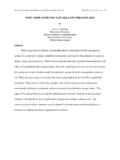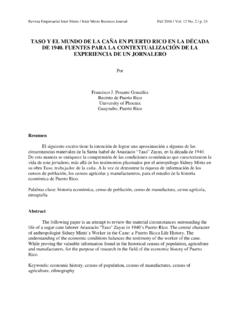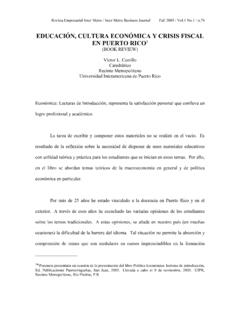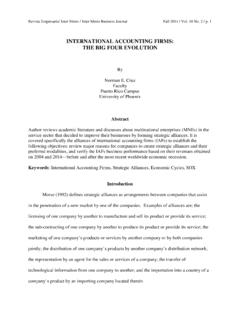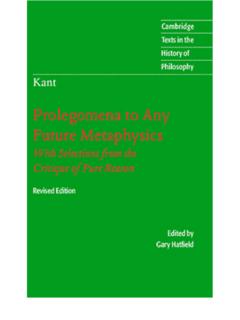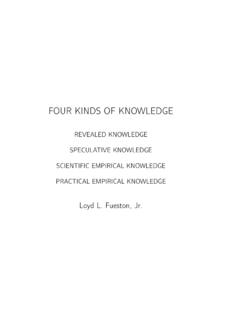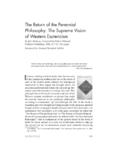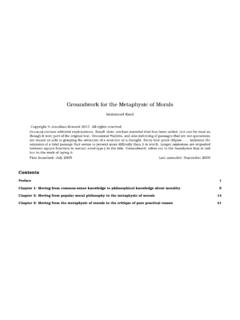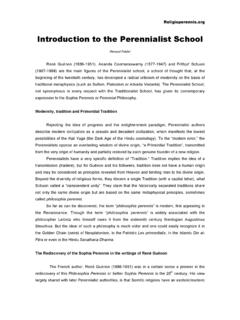Transcription of EMPIRICAL AND REALISTIC APPROACHES OF …
1 Revista Empresarial Inter Metro / Inter Metro Business Journal Spring 2006 / Vol 2 No. 1 / p. 88 EMPIRICAL AND REALISTIC APPROACHES OF RESEARCHByAhmad H Juma'hProfessorMetropolitan CampusInter American University of Puerto RicoAbstractThis article presents the views and assumptions of logical positivism approach andrealistic approach in conducting social science research in general and business research inparticular. Logical positivism has influenced research methodologies in social science, inparticular model building . The main assumptions of logical positivism are concerned withobservation and verification principle.
2 In the REALISTIC approach of the social sciencephilosophy, the conceptualization idea of theory plays a central role in social science dispute between logical positivist approach and REALISTIC approach to conduct socialresearch is an important issue to understand the basic assumptions and theories used by businessresearchers. A fundamental issue in the philosophy of social science is the extent to which wecan apply natural science research methods and methodologies to social science research (Bhaskar, 1978, Lawson, 1997, Dow, 1999).
3 Bhaskar (1978) redefined the debate betweennatural science and social science as a dispute between a naturalist tradition based on positivistprinciples with its ideal of unified science and a rival anti-naturalist tradition. A distinctionshould be made between research methods applicable in natural and social sciences, based on thedistinction between their respective subject describing the logical positivism approach and the REALISTIC approach, this article isorganized as follows: the first section, after the introduction, discusses the emergence andassumptions of logical positivism that include the main propositions of logical positivism:verification principle and models building.
4 The second section presents the views andassumptions of realism in conducting research in social science. The main REALISTIC attacks onlogical positivism approach are presented in the third section and the conclusion is given in thefourth Empresarial Inter Metro / Inter Metro Business Journal Spring 2006 / Vol 2 No. 1 / p. 89 The emergence and assumptions of the logical positivism approachThe logical positivism emerged in the 1920s and 1930s as a consequence ideas of adiscussion group of philosophers, mathematicians and scientists organized by Moritz Schlick(1882-1936) to investigate scientific language and methodology.
5 The group is known as theVienna Circle. David Hume (1711-1776), an empiricist, and the physicist Ernest Mach (1838-1916) influenced the development and underlying philosophy of the Vienna Circle, in particularits first idea of empiricism. Bertrand Russell (1872-1970) and Ludwig Wittgenstein influencedthis group with their logical approach. Ludwig Wittgenstein s Tractatus logico-philosophicus had a significant influence on the circle s main tenet the verification principle. Bertrand Russelland Alferd Whitehead formulated a new form of logic in their work Principia Mathematica ,which applied the logical tools of analysis to EMPIRICAL investigation.
6 This new logic was thenadopted by the circle in their analysis. The term positivism , coined by Auguste Comte, in general is used as a name for a formof strict empiricism: the positivist maintains that only those knowledge claims which are foundeddirectly on experience are genuine. Modern logical positivism, in particular the positivism of theVienna Circle, is a form of positivism which accepts the symbolic logic of PrincipiaMathematica as its primary tool of analysis (Brown, 1977). Positivism is a theory of knowledgewhich only allows statements that are based on EMPIRICAL data, collected through positivism is an extension of this concept and as is logical analysis and mathematicaltechniques.
7 Logical positivism is a form of reasoning based on two key concepts, the collectionof experiences yielding EMPIRICAL data and the logical analysis of this data. Therefore, it imposeson its practitioners a structure of thinking and leads to a particular form of theory because onlycertain types of knowledge are are two central problems in the theory of knowledge: the problems of meaning andof truth. Logical positivists asserted that Only meaningful statements were to be permittedscientific consideration and accorded the status of knowledge claims (Caldwell, 1984).
8 Forlogical positivists a meaningful statement is either analytic or verifiable. Analytical statementsare concerned with tautologies; it is true for all values, or self-contradictions. Verifiablestatements are concerned with EMPIRICAL testing. The meaning of a statement, according to theprinciple of verifiability, consists of how it is verified or falsified. If a statement can not beRevista Empresarial Inter Metro / Inter Metro Business Journal Spring 2006 / Vol 2 No. 1 / p. 90determined to be true or false, it is nonsense. For Hume, the basic element of experience wasimpression.
9 Furthermore, Wittgenstein took the facts not just questions or happenings such as itis raining but confirmed that it is raining at a given time and place . Under such criteria,deriving a meaningful proposition entails the true source of knowledge. These purportedpropositions are: Formal proposition: tautologies and contradiction only determined by examining theirform that they are meaningful. Tautologies agree with every truth distribution of atomicstatements. For example the normal balance of any account ( cash) is credit or agree with no truth distribution of atomic statements the normalbalance of cash is credit and is debit.
10 Atomic proposition: determined by examining whether they conform or fail to conform to thefacts the normal cash balance is credit. Molecular proposition: they are the truth functions of an atomic proposition and their value isdetermined by first determining the truth values of an atomic proposition and then applyingthe logical constants accounting equation: assets equals to liabilities and equity. Pseudo-proposition: different from the above; mere meaningless combinations of sounds andsigns with no cognitive content; known as a metaphysical proposition, as they are not directlyobservable and hence cannot be tested.
